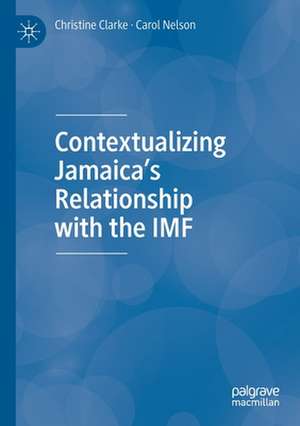Contextualizing Jamaica’s Relationship with the IMF
Autor Christine Clarke, Carol Nelsonen Limba Engleză Paperback – 7 oct 2021
| Toate formatele și edițiile | Preț | Express |
|---|---|---|
| Paperback (1) | 389.49 lei 6-8 săpt. | |
| Springer International Publishing – 7 oct 2021 | 389.49 lei 6-8 săpt. | |
| Hardback (1) | 394.12 lei 6-8 săpt. | |
| Springer International Publishing – 6 oct 2020 | 394.12 lei 6-8 săpt. |
Preț: 389.49 lei
Nou
Puncte Express: 584
Preț estimativ în valută:
74.54€ • 77.53$ • 61.54£
74.54€ • 77.53$ • 61.54£
Carte tipărită la comandă
Livrare economică 15-29 aprilie
Preluare comenzi: 021 569.72.76
Specificații
ISBN-13: 9783030446659
ISBN-10: 3030446654
Pagini: 318
Ilustrații: XXII, 318 p. 14 illus.
Dimensiuni: 148 x 210 mm
Greutate: 0.45 kg
Ediția:1st ed. 2020
Editura: Springer International Publishing
Colecția Palgrave Macmillan
Locul publicării:Cham, Switzerland
ISBN-10: 3030446654
Pagini: 318
Ilustrații: XXII, 318 p. 14 illus.
Dimensiuni: 148 x 210 mm
Greutate: 0.45 kg
Ediția:1st ed. 2020
Editura: Springer International Publishing
Colecția Palgrave Macmillan
Locul publicării:Cham, Switzerland
Cuprins
1. Introduction. -2. Jamaica “Comin’ in from de Cold”.- 3. The Moyne Commission.- 4. Jamaica: Independence Realized.- 5. Introducing the International Monetary Fund.- 6. A Clash of Ideologies: Jamaica and the International
Monetary Fund.- 7. The 1980s and 1990s: Inflection Points?.- 8. Economic Policy Independence: Jamaica’s Initial Experience.- 9. The Local Approach ‘Under the Microscope’: International Monetary Fund Article IV Reviews.- 10. Born of Crisis: The Public Sector Memorandum of Understanding.- 11. The Perfect Storms.
Monetary Fund.- 7. The 1980s and 1990s: Inflection Points?.- 8. Economic Policy Independence: Jamaica’s Initial Experience.- 9. The Local Approach ‘Under the Microscope’: International Monetary Fund Article IV Reviews.- 10. Born of Crisis: The Public Sector Memorandum of Understanding.- 11. The Perfect Storms.
Notă biografică
Christine Clarke is Lecturer in Public Policy, Development Economics, and Finance and Development at the University of the West Indies, Mona, Jamaica. She serves on the Board of the Bank of Jamaica, Jamaica’s central bank, and she has worked at the Planning Institute of Jamaica in various capacities, from Economic Advisor to the Director-General to the Director of Economic Planning and Research. She earned her PhD in Public Finance from Rice University, USA.
Carol Nelson is Lecturer in the Department of Government at the University of the West Indies, Mona, Jamaica. She has over 20 years of experience in the public sector, interfacing with international financial, regional and development institutions and has represented the Government of Jamaica in varying capacities, inclusive of CARICOM, on the Board of the Caribbean Development Bank (CDB), and at the UN. Her first book, Social Partnership and Governance Under Crises captures the development of network relations in furthering governance of the public sector under crisis conditions in the Jamaican context. Holding a PhD in Government as well as a Professional Certificate in Strategic Climate Change Adaptation, she lectures on subject areas of International Political Economy and Organizations, Analysis of Political Opinion & Media, Governance and Climate Change.
Textul de pe ultima copertă
This ambitious book provides a comprehensive quantitative and qualitative assessment of Jamaica’s ties to the International Monetary Fund, focusing on Jamaica’s historical relationship with the IMF and reflecting on the domestic and international discourse surrounding the evolution of this relationship. Notably, this volume presents a critical analysis of Jamaica’s first engagement with and departure from the IMF and interrogates the political economy of the period. Jamaica’s economic experiences are assessed in the context of major global events, including the food price crises of 2007 and the global economic crises of 2008 and 2009. This book also looks at policy implications, and its well-researched analysis will be of great value to practitioners and policymakers as well as academics.
Caracteristici
Illuminates the political economy realities that have shaped economic decision-making in Jamaica Provides a comprehensive yet contextualized overview of Jamaica’s historical relationship with the International Monetary Fund Draws from a wide variety of data sources to offer a holistic, multidimensional analysis
